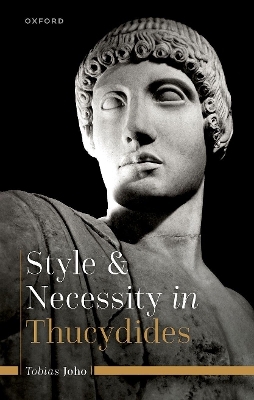
Style and Necessity in Thucydides
Oxford University Press (Verlag)
978-0-19-881204-3 (ISBN)
Ancient literary critics were struck by what they described as Thucydides' "nominal style," a term that refers to Thucydides' fondness for abstract nominal phrases. As this book shows, Thucydides frequently uses these phrases instead of approximately synonymous verbal and personal constructions. These stylistic choices tend to deemphasize human agency: people find themselves in a passive role, exposed to incidents happening to them rather than being actively in charge of events. Thus, the analysis of the abstract style raises the question of necessity in Thucydides.
On numerous occasions, Thucydides and his speakers use impersonal and passive language to stress the subjection of human beings to transpersonal forces that manifest themselves in collective passions and an inherent dynamic of events. These factors are constitutive of the human condition and become a substitute for the notion of divine fatalism prevalent in earlier Greek thought. Yet Thucydidean necessity is not absolute. It stands in the tradition of a type of fatalism that one finds in Homer and Herodotus. In these authors, the gods or fate tend to settle the outcome of the most significant events, but they leave leeway for the specific way in which these pivotal events come to pass. Thus, the Greeks endorsed a malleable variant of necessity, so that considerable scope for human choice persists within the framework fixed by necessity. Pericles turns out to be Thucydides' prime example of an individual who uses the leeway left by necessity for prudent interventions into the course of events.
Tobias Joho is a lecturer at the Department of Classics of the University of Bern in Switzerland. His research interests include ancient Greek historiography and the modern fascination with ancient Greece. He has published journal articles on various aspects of Thucydides and contributed an essay entitled "Thucydides, Epic, and Tragedy" to the Oxford Handbook of Thucydides. He has also written scholarly articles on Jacob Burckhardt's reflections on the defeat of Athens in the Peloponnesian War, on both Burckhardt's and Nietzsche's engagement with the "agonal spirit" of the Greeks, and on the distinctive style of Goethe's novel Elective Affinities.
Acknowledgements
Introduction
1: Thucydides' Abstract Nominal Style: The Main Features and Differences from the Plain Style
2: The Implications of Thucydides' Abstract Style: The Pathology
3: The Passivity of the Powerful
4: A World Governed by Neuters: "The Human" as a Substitute for
| Erscheinungsdatum | 24.01.2023 |
|---|---|
| Verlagsort | Oxford |
| Sprache | englisch |
| Maße | 145 x 223 mm |
| Gewicht | 560 g |
| Themenwelt | Literatur ► Klassiker / Moderne Klassiker |
| Geschichte ► Allgemeine Geschichte ► Vor- und Frühgeschichte | |
| Geisteswissenschaften ► Sprach- / Literaturwissenschaft ► Anglistik / Amerikanistik | |
| Geisteswissenschaften ► Sprach- / Literaturwissenschaft ► Literaturwissenschaft | |
| ISBN-10 | 0-19-881204-3 / 0198812043 |
| ISBN-13 | 978-0-19-881204-3 / 9780198812043 |
| Zustand | Neuware |
| Haben Sie eine Frage zum Produkt? |
aus dem Bereich


